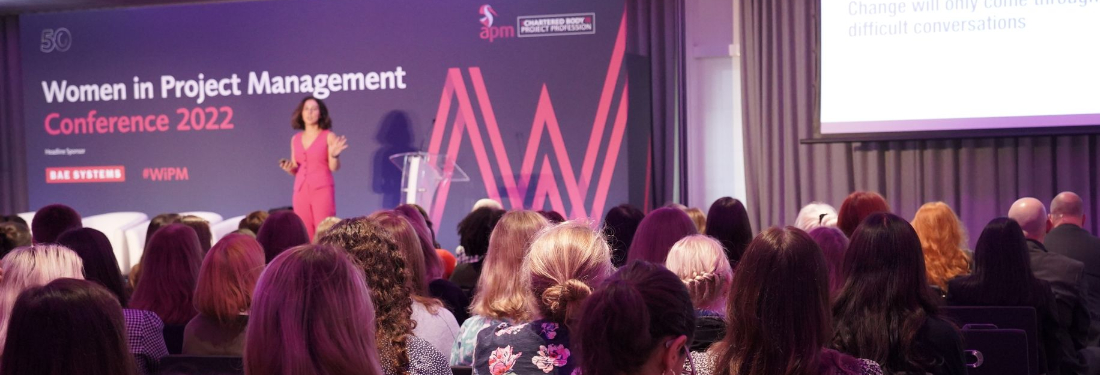APM’s Women in Project Management Conference 2022 was a catalyst for change

Sharing practical tips, personal stories (both good and bad) and new ideas on how women can get ahead in the project profession is what WiPM is all about, and the 2022 conference – the first in-person meet-up for four years – was buzzing with inspiration.
A conference like this, crammed with more than 500 female project professionals, is a rare, invaluable opportunity for women from every walk of the profession, from student to senior leader, to exchange perspectives, ask forthright questions and galvanise determination to keep improving ED&I back at base camp.
A sense of belonging to create inclusion
One of the key themes of the day centred on the challenge of creating a sense of belonging. How do you lead a team where everyone feels they belong? How do you include women in your organisational or project team cultures at every level? And how do you retain your talent by helping them feel that they belong with you and that they are respected and listened to?
Post-pandemic, where the workforce wants to reset and Gen Z have their own demands from work, “an unempathetic leader is not okay anymore”, said Belinda Parmar, CEO of The Empathy Business and WiPM’s keynote speaker.
Try becoming more empathetic, she urged. Empathy, she explained, is “the emotional impact of a company on its staff” and boils down to “feeling with people”. Empathy, however, is not sympathy. She pointed delegates to Brené Brown’s excellent explanation.
How to improve your empathy skills
The more empathetic you are as an organisation, and as individual manager or leader, the more successful your teams will be, and the more people will want to work for you, because everyone feels more engaged and more connected.
But getting in touch with your empathetic side is easier said than done (and is secondary in effectiveness if the systems and processes of the organisation you work for are unempathetic). We all sit on a sliding scale of empathy, explained Parmar, and we can only try our best to understand ourselves better and move towards greater empathy.
This is where ‘empathy nudges’ can come in handy. First, ask yourself whether you are showing empathy or sympathy (there’s a big difference). And second, embrace a difficult conversation that you have been putting off, because change will only come through conversations like these.
“You will learn the most from difficult people,” Parmar said. Be honest and show your own vulnerabilities – if you do this, then you will find your connection with your colleagues will become stronger.
Leaders can improve their levels of empathy by being more self-aware (taking the empathy test by autism researcher Simon Baron-Cohen is a good place to start). Parmar also suggested asking for some feedback on where you could have responded better, and then putting everything you have learnt about yourself into practice – and keep practising.
Empathy to create unity
Parmar’s insight on empathy resonated among WiPM’s delegates, who saw higher levels of empathy at work as a way to unite teams across genders and help women feel that they belong. “It’s not how many women are in the organisation [that is most important],” she said, “but if they feel that they belong. More male-dominated sectors have an empathy deficiency.”
She said that the biggest barrier to greater empathy “is putting process over people”. Empathy as a way to increase inclusion though project teams and organisations trickled through the rest of the day’s sessions and discussions, with delegates taking it back to the office as a way to catalyse change.
And why doesn’t APM start its own Empathy SIG? Parmar suggested…
You may also be interested in:


0 comments
Log in to post a comment, or create an account if you don't have one already.